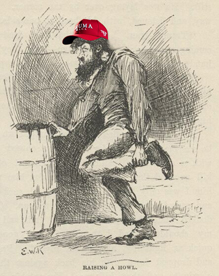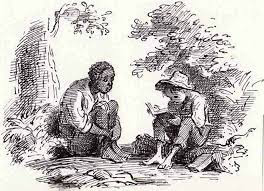Remember when Donald Trump claimed he could do anything back in 2016?
I could stand in the middle of Fifth Avenue and shoot somebody, and I wouldn’t lose any voters, OK?
The claim, and its truth, reminds me of Colonel Sherburn in Mark Twain’s The Adventures of Huckleberry Finn. Irritated by the constant carping of old man Boggs, Sherburn carries out his threat to shoot him in the middle of the street. The crowd is outraged, but no-one will take any action. Sherburn mocks them:
…you’re afraid to back down—afraid you’ll be found out to be what you are—cowards—and so you raise a yell, and hang yourselves on to that half-a-man’s coat-tail, and come raging up here, swearing what big things you’re going to do.
Although published in 1885 after the violent split across America caused by the Civil War, The Adventures of Huckleberry Finn presents an America which is readily recognisable in the divided States we see today. And it is Huck’s father, Pap, who strikes the most chords.
 Aggressively incoherent, a determination to blame others and a violent distrust of government and law, he seems a clear precursor to Trump. He is particularly upset when he sees people of colour doing well under what he sarcastically calls the ‘wonderful govment’ and in Chapter 6 focuses his anger on a formerly enslaved man:
Aggressively incoherent, a determination to blame others and a violent distrust of government and law, he seems a clear precursor to Trump. He is particularly upset when he sees people of colour doing well under what he sarcastically calls the ‘wonderful govment’ and in Chapter 6 focuses his anger on a formerly enslaved man:
He had the whitest shirt on you ever see, too, and the shiniest hat; and there ain’t a man in that town that’s got as fine clothes as what he had; and he had a gold watch and chain, and a silver-headed cane—the awfulest old gray-headed nabob in the State. And what do you think? They said he was a p’fessor in a college, and could talk all kinds of languages, and knowed everything. And that ain’t the wust. They said he could vote when he was at home. Well, that let me out. Thinks I, what is the country a-coming to?
There we have the tantrum of the Trumpist, believing that America is just for people like them and that people who look different and have a different history have no place in the American system, making them feel as if America is an ‘occupied country’. Pap’s horror that his man ‘could vote’ explains the hard-right Republican focus on voter suppression. It’s hard to read the passages about Pap in the novel without seeing him in a red MAGA hat.
Note too Pap’s scathing account of the man’s education. He can’t even admit his intellect directly; it remains hearsay – ‘They said he was a p’fessor in a college’. The hyperbole of ‘all kinds of languages’ and ‘knowed everything’ indicates Pap’s scorn. It isn’t only this man’s education which Pap distrusts, but his son’s too, even threatening him with violence if he continues with it:
I won’t have it. I’ll lay for you, my smarty; and if I catch you about that school I’ll tan you good.
Partly that is a product of Pap’s jealousy, but it also stems perhaps from his fear that Huck will be educated enough to see the world independently, to make his own judgements from a perspective different from his father’s. Is this not why Republican states have repeatedly attacked and restricted education, books and teachers?
 Pap’s fears are well-founded. Huck’s journey down the Mississippi provides the education, and during it he discovers an alternative father-figure in Jim, fleeing slavery. The effects of their companionship and mutual care come to a head in Chapter 31, when Huck rejects the callings of ‘sivilized’ society which demands the return of Jim to his slave-owner Miss Watson. He remembers the ways they have looked after each other, and that Jim has said that Huck ‘was the best friend old Jim ever had in the world, and the only one he’s got now’, and that this is mutual. So he consciously separates himself from a society apparently based on Christian values and says:
Pap’s fears are well-founded. Huck’s journey down the Mississippi provides the education, and during it he discovers an alternative father-figure in Jim, fleeing slavery. The effects of their companionship and mutual care come to a head in Chapter 31, when Huck rejects the callings of ‘sivilized’ society which demands the return of Jim to his slave-owner Miss Watson. He remembers the ways they have looked after each other, and that Jim has said that Huck ‘was the best friend old Jim ever had in the world, and the only one he’s got now’, and that this is mutual. So he consciously separates himself from a society apparently based on Christian values and says:
All right, then, I’ll go to hell.
It is a forceful irony clearly not shared by the Trump-supporting Christian right, who perhaps like the Shepherdsons and Grangerfords, take their rifles and their hatreds to church with them.
Of course Pap is no Trump – his poverty and alcoholism see to that. But he is very much a Trump supporter, suffering from his poverty and feeling disenfranchised from the society and systems of his country. The problem for Pap, though, is that however much he would lean towards Trump as an expression of his concerns and resentments, and however much Trump would stoke and rely on those, Trump would do nothing for him, having in fact no interest in the left-behind, the poor and the disenfranchised. Instead he would strengthen the hand of the big men that profit from their exploitation.
What would an America based on Pap’s grudges look like? We are about to find out. It’s likely to be worse second time around.